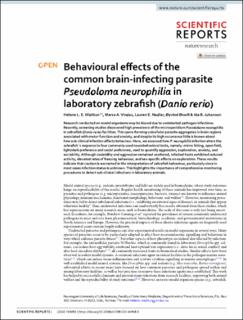| dc.description.abstract | Research conducted on model organisms may be biased due to undetected pathogen infections. Recently, screening studies discovered high prevalence of the microsporidium Pseudoloma neurophilia in zebrafish (Danio rerio) facilities. This spore-forming unicellular parasite aggregates in brain regions associated with motor function and anxiety, and despite its high occurrence little is known about how sub-clinical infection affects behaviour. Here, we assessed how P. neurophilia infection alters the zebrafish´s response to four commonly used neurobehavioral tests, namely: mirror biting, open field, light/dark preference and social preference, used to quantify aggression, exploration, anxiety, and sociability. Although sociability and aggression remained unaltered, infected hosts exhibited reduced activity, elevated rates of freezing behaviour, and sex-specific effects on exploration. These results indicate that caution is warranted in the interpretation of zebrafish behaviour, particularly since in most cases infection status is unknown. This highlights the importance of comprehensive monitoring procedures to detect sub-clinical infections in laboratory animals. | en_US |

